

I Liked Everything I Saw on Facebook for Two Days. Here’s What It Did to Me. Court: Police can take DNA swabs from arrestees - News Nation Washington. WASHINGTON (AP) — A sharply divided Supreme Court on Monday said police can continue to take DNA from people they arrest without getting a warrant.
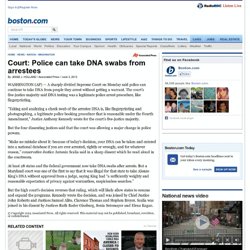
The court’s five-justice majority said DNA testing was a legitimate police arrest procedure, like fingerprinting. ‘‘Taking and analyzing a cheek swab of the arrestee DNA is, like fingerprinting and photographing, a legitimate police booking procedure that is reasonable under the Fourth Amendment,’’ Justice Anthony Kennedy wrote for the court’s five-justice majority. But the four dissenting justices said that the court was allowing a major change in police powers. Faster, Sooner: Why The U.S. Needs 'Gigabit Communities'
Guest post written by Julius Genachowski Julius Genachowski is chairman of the Federal Communications Commission.

Walking the floor of the Consumer Electronics Show last week, I kept thinking of that line from Jaws, “You’re going to need a bigger boat.” All the Internet-connected, data-hungry gadgets that are coming to market sent a strikingly clear message: we’re going to need faster broadband networks. Internet remains unregulated after UN treaty blocked. A proposed global telecoms treaty that would give national governments control of the internet has been blocked by the US and key western and African nations.
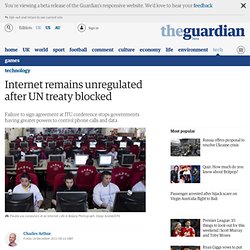
They said they are "not able to sign the agreement in its current form" at the end of a International Telecoms Union (ITU) conference in Dubai. The proposals, coming after two weeks of complex negotiation, would have given individual governments greater powers to control international phone calls and data traffic, but were opposed as the conference had seemed to be drawing to a close late on Thursday.
The move seems to safeguard the role of the internet as an unregulated, international service that runs on top of telecoms systems free of direct interference by national governments. Info/Law » U.S. Gets In on Censorship Action. The United States Immigration and Customs Enforcement, part of the Department of Homeland Security, has seized 82 domain names that it contends are responsible for facilitating IP infringement (and perhaps infringing themselves).
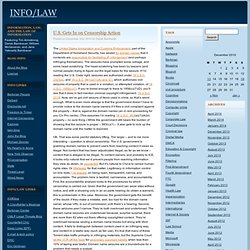
Swiss Govt: Downloading Movies and Music Will Stay Legal. One in three people in Switzerland download unauthorized music, movies and games from the Internet and since last year the government has been wondering what to do about it.
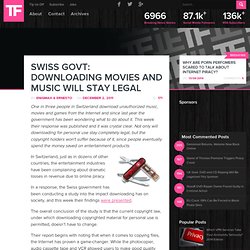
This week their response was published and it was crystal clear. Not only will downloading for personal use stay completely legal, but the copyright holders won't suffer because of it, since people eventually spend the money saved on entertainment products. In Switzerland, just as in dozens of other countries, the entertainment industries have been complaining about dramatic losses in revenue due to online piracy.
In a response, the Swiss government has been conducting a study into the impact downloading has on society, and this week their findings were presented. The overall conclusion of the study is that the current copyright law, under which downloading copyrighted material for personal use is permitted, doesn’t have to change. Italy Proposes Law That Will Ban People From The Internet Based On Single Accusation Of Infringement From Anyone. Glyn Moody points us to a frightening analysis of a proposed copyright law in Italy that seems positively ridiculous, in that you could lose access to the internet based on a single accusation (which doesn't even have to come from the copyright holder): The post notes that this law would be compliant with an early version of ACTA, and suggests that this was done on purpose.
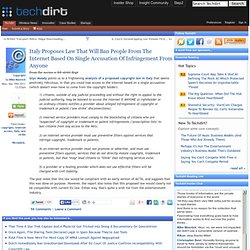
However, the report also notes that this proposed law would clearly not be compatible with current EU law. Cable Reveals Extent Of Lapdoggery From Swedish Govt On Copyright Monopoly. Among the treasure troves of recently released WikiLeaks cables, we find one whose significance has bypassed Swedish media.
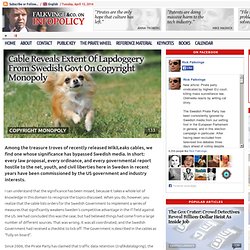
New Zealands Three Strikes Law was Pushed, Bought and Paid for by the US - Wikileaks. The slow trickle of leaked diplomatic cables from Wikileaks may not be in the headlines as much as it was when it started, but revelations keep pouring out of the website. Recently, new diplomatic cables published on the site revealed just how, not only influential the US was, but just how much control the US had over the passage of the three strikes law in New Zealand. If there wasn’t any anti-American sentiment before in New Zealand, there certainly will be for some after new diplomatic cables were published revealing the role the US had in pushing for a three strikes law in New Zealand.
The New Zealand’s new three strikes law was the most controversial copyright laws in the country and one of the most controverisal in the world. While the law was being proposed, debate was fierce. The law sparked repeated blackout protests where websites would black out their website logo’s in protest of the law since it is widely seen as a censorship law more than a copyright enforcement law. “Trolling the Stream” (Be Jailed for Streaming?) by UltraDavid. David “UltraDavid” Graham (for Shoryuken.com) explains why, if bill S.978 passes, you could be jailed for streaming video games, or even uploading them to youtube; The United States Senate is in the process of considering bill S.978, a bill “To amend the criminal penalty provision for criminal infringement of a copyright,” or as you might know it, the Anti-Streaming Bill.
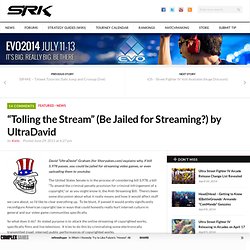
There’s been some discussion about what it really means and how it would affect stuff we care about, so I’d like to clear everything up. To be blunt, if passed it would pretty significantly reconfigure American copyright law in ways that could honestly really hurt internet culture in general and our video game communities specifically. So what does it do? Its stated purpose is to attack the online streaming of copyrighted works, specifically films and live television. Background: the law is split into criminal law and civil law.
Did the FCC just bless a capped, two-tier Internet? You like the idea of Internet data caps and overage charges, right?

And the prospect of paying your ISP separate fees for "the Internet" and for "managed" IP services like voice, video, VPN, telehealth, and smart grid applications, even when these directly compete with similar Internet-delivered services? Okay, you probably don't—if you're a business or home Internet user. The U.N. Declares Internet Access a Human Right. The United Nations counts internet access as a basic human right in a report that bears implications both to on-going events in the Arab Spring and to the Obama administration's war on whistleblowers.
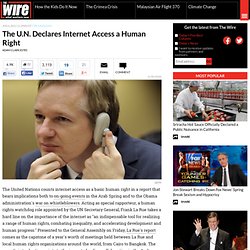
Senator Al Franken: No joke, Comcast trying to whack Netflix. United Nations report: Internet access is a human right - Los Angeles Times. U.S. Military Wanted to Provoke War With Cuba. In the early 1960s, America's top military leaders reportedly drafted plans to kill innocent people and commit acts of terrorism in U.S. cities to create public support for a war against Cuba. Code named Operation Northwoods, the plans reportedly included the possible assassination of Cuban émigrés, sinking boats of Cuban refugees on the high seas, hijacking planes, blowing up a U.S. ship, and even orchestrating violent terrorism in U.S. cities. The plans were developed as ways to trick the American public and the international community into supporting a war to oust Cuba's then new leader, communist Fidel Castro. America's top military brass even contemplated causing U.S. military casualties, writing: "We could blow up a U.S. ship in Guantanamo Bay and blame Cuba," and, "casualty lists in U.S. newspapers would cause a helpful wave of national indignation.
" "These were Joint Chiefs of Staff documents. Gunning for War. UPDATE 2-U.S. House rejects FCC's 'open' Internet rules. New GRAMA bill much more than restricting electronic access to information - ksl.com. FCC: 68% Of U.S. Connections Slower than 3 Mbps Down, 768kbps Up - As critics say FCC reports still gloss over competitive shortcomings. BitTorrent Based DNS To Counter US Domain Seizures. Comcast Starts ‘Toll Booth’ for Web, Level 3 Says.